Go back to Faculty and Staff
Go back to Your Studies
Books
- (Pop) Cultures on the Move: Transnational Identifications and Cultural Exchange Between East and West
- Rethinking Gender in Popular Culture in the 21st Century: Marlboro Men and California Gurls
- Gender Überall!? Beiträge zur interdisziplinären Geschlechterforschung
- Is It 'Cause It's Cool? Affective Encounters with American Culture
- Body Signs: The Latino/a Body in Cultural Production
- Making National Bodies: Cultural Identity and the Politics of the Body in (Post-) Revolutionary America
- (Anti)-Americanisms
- Bodily Sensations: The Female Body in Late-Eighteenth-Century American Culture
- Articulating Selves: Contemporary Chicana Self-Representation
Books
(Pop-) Cultures on the Move: Transnational Identifications and Cultural Exchange Between East and West
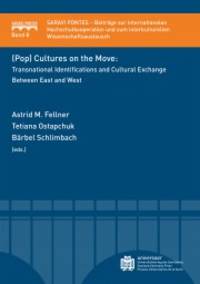
Edited by Astrid M. Fellner, Tetiana Ostapchuk and Bärbel Schlimbach
Saarbrücken: Universaar, 2018.
This collection examines how the signifier 'America' functions as an intermediary in the production of transnational identities and analyzes how different forms of cultural exchange between 'East' and 'West' are constituted in literary and cultural texts. In particular, the essays investigate the transnational flow of cultural texts, analyzing how, by whom, and to what purposes and effects (pop)cultural practices have been appropriated and transferred to local contexts and how the significance of place, especially the category of the national, has changed in the process. Analyzing various spaces of cultural transmission, the articles focus on patterns of movement and the flows of culture in order to approximate the question of whether the dialogue with 'America' in the 21st century still plays a vital role in the production of 'European' identities. What specific role does the flexibility and adaptability of the signifier 'American' play in this intermediary function of American culture? This book therefore gauges the potential and the limits of 'American' culture as a third term that can 'other' both national and European traditions (for identification or dis-identification) and can serve to reconstruct and to transgress national cultural identities.
Rethinking Gender in Popular Culture in the 21st Century: Marlboro Men and California Gurls
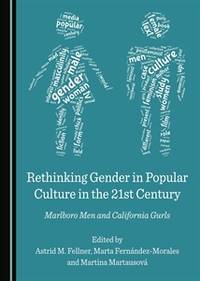
Edited by Astrid M. Fellner, Marta Fernández-Morales and Martina Martausová
Cambridge Scholars Publishing, 2017.
This book explores popular culture representations of gender, offering a rich and accessible discussion of masculinities and femininities in 21st-century popular media. It brings together contributors from various European countries to investigate the workings of gender in contemporary pop culture products in a brave, original, and rigorous way.
This volume is both an academic proposal and an exercise of commitment to a serious analysis of some of the media that influence us most in our everyday lives. Representation matters, and the position we take as viewers or consumers during reception matters even more.
View table of contents.
Gender Überall!? Beiträge zur interdisziplinären Geschlechterforschung
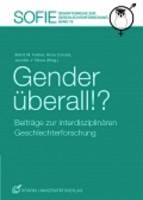
Ed. Astrid M. Fellner, Anne Conrad und Jennifer J* Moos.
Gender ist zu einem Leitbegriff in Politik, Gesellschaft und Forschung avanciert. Gender ist überall! Aber stimmt diese affirmative Feststellung? Ist Geschlechterforschung in postfeministischen Zeiten noch aktuell? Wie werden konkrete gesellschaftliche Probleme und Fragen zu den Geschlechter-verhältnissen in verschiedenen wissenschaftlichen Disziplinen diskutiert? Gender Überall!? bietet einen Einblick in rezente Forschungsansätze der Gender Studies und zeigt auf, was die Wissenschaft in Bezug auf Genderfragen leisten kann. Die Beiträge reichen von Literatur- und Sprachwissenschaften über Philosophie, Theologie, Pädagogik und Sozialwissenschaften bis hin zu Biologie und Medizin. Dabei wird durchweg deutlich, wie notwendig es ist, geistes-, sozial-, natur- und kulturwissenschaftliche Fragestellungen miteinander in Dialog zu bringen.
St. Ingbert: Röhrig Verlag, 2014.
Is It 'Cause It's Cool? Affective Encounters with American Culture
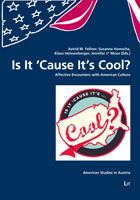
Ed. Astrid M. Fellner, Susanne Hamscha, Klaus Heissenberger and Jennifer J* Moos.
Even a global political watershed such as the end of the Cold War seems to have left a fundamental characteristic of cultural relations between the U.S. and the rest of the world unchanged: American popular culture still stirs up emotion, its products, artifacts, and practices entangling their consumers in affective encounters characterized by feelings of fascination, excitement, or even wholesale rejection. What is it that continues to make 'American' popular culture popular or unpopular? Is it because 'American' culture is still cool? Which role does Cool play in the consumers' affective encounters with 'America'? This volume of essays offers new insights on the post-Cold-War dissemination of American popular culture, exploring the manifold ways in which Cool has emerged as an elusive yet
determining factor of an American culture gone global.
Body Signs: The Latino/a Body in Cultural Production
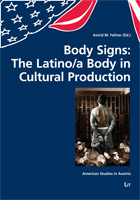
Ed. Astrid M. Fellner.
This collection of scholarly articles as well as creative writings by leading Chicano/a writers and critics focuses on the primacy of the body as the site and means of enunciation in U.S. Latino/a culture. Exploring the multiple forms of how the body is written, performed, and represented, the essays address a series of questions such as: In what ways is the body depicted as the site where representations of difference and identity are inscribed? By considering how cultural signifiers, practices, and discourses have been creatively reconfigured, this volume asserts the significance of the body in Latino/a cultural production.
Wien: LIT Verlag, 2011
Making National Bodies: Cultural Identity and the Politics of the Body in (Post-) Revolutionary America
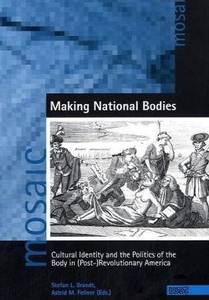
Stefan L. Brandt, Astrid M. Fellner (Eds.)
Making National Bodies addresses the discourse of the body in Revolutionary and post-Revolutionary America. While recent literary and cultural criticism has extensively explored the relation between concepts of the nation and the body, this volume of essays contributes to the academic dialogue by addressing a crucial period of American history.
The trope of the body gained particular importance during this era of emerging nationalism, especially when the body politic, its weaknesses and strengths were seen and described in terms of bodily functions: infections, virtuousness, and purity became key terms in the description of the nation. In the early years of the Republic, the imaginary, the rhetorical, and the symbolic were employed for the making of the nation. Topics such as the metaphorical constitution of the body in literary texts, or the body in the medical discourse of the time are taken up in some of the essays while others investigate how the Republic and the nation were invented in foundational fictions and epic poems. The essays collected in this volume assert that the discourse of embodiment was indispensible for the construction of a stable national identity in post-Revolutionary America. The aesthetics of corporeal self-fashioning was instrumental in generating the basis for a rhetoric of "making the national body."
Trier: WVT Wissenschaftlicher Verlag Trier, 2010
(Mosaic; Vol. 38)
(Anti)-Americanisms
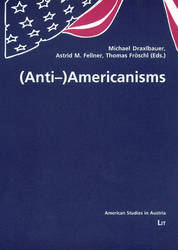
Michael Draxlbauer, Astrid M. Fellner, Thomas Fröschl (Eds.)
"(Anti-)Americanisms" is a collection of articles presented during the international conference of the Austrian Association for American Studies in 2002. Focusing on the various propagations of American culture in literature, music, film, "the new media", architecture, politics, and the ways of life, these essays question the notion of (Anti-)Americanism as an object-oriented construct, a convenient vehicle used to transport ideology. The spectrum of topics includes the historical dimensions of European anti-Americanism, roots of anti-Americanism in post-World-War II Austria, and the relationship between anti-Americanism and American Studies.
(American Studies in Austria Vol. 2)
Bodily Sensations: The Female Body in Late-Eighteenth-Century American Culture
(under review)
Articulating Selves: Contemporary Chicana Self-Representation
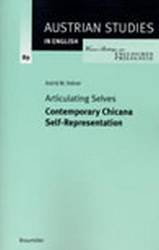
Astrid M. Fellner
Articulating Selves proposes a critical approach to Chicana identity in literature, supporting the thesis that ethnic identity is constructed through the articulation of the literary characters' multiple selves. The analysis of the works of Wilbur-Cruce, Cisneros, Ortiz Taylor, Castillo, Limón, and Martínez places identities at the intersections of ethnicity, gender, sexuality, and class, focusing on characters' projects of reconstructing their past. The characters' ethnic projects are inextricably linked into memory, which gives past events new readings through a process of ethnic semiosis. The notion of 'Articulating Selves' also promotes a way of assuming the subject's agency, as the characters give voice to their visions of 'woman' as an active, dynamic subject.
(Austrian Studies in English; 89)